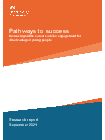How to improve disadvantaged young people’s engagement with formal career advice

A report exploring how to improve disadvantaged young people’s engagement with formal career advice, especially online.
In this report, the Social Mobility Commission commissioned the Behavioural Insights Team to investigate whether the use of behavioural interventions would boost the engagement of disadvantaged young people on digital careers advice platforms with the ultimate aim of improving their education and labour market outcomes.
To enable rapid testing of interventions, the SMC worked with two digital career advice platforms: Unifrog (which helps students in years 9-13 to learn about career options) and GetMyFirstJob (which helps young people aged 14+ to find their first jobs by listing vacancies and providing career guidance).
Researchers conducted a rapid evidence review of the barriers to engagement with formal career education. Based on the findings from our evidence review, two interventions were tested:
- A 5-minute motivational activity
- A 5-minute motivational activity plus informative, belonging-oriented nudges
The report finds little evidence that the interventions increased engagement or aspiration levels for our target group, but did find differences between gender, age and disadvantage.
The report recommends that careers advice providers undertake further work to identify and address any disparities related to disadvantage on their platforms. Careers advice providers should invest in further sustained interventions and research to tackle differences in engagement and aspiration between groups of students.
Documents












Responses